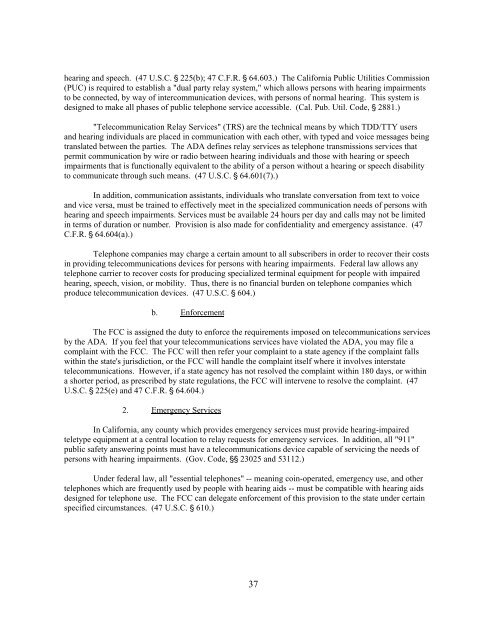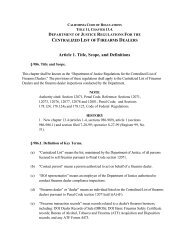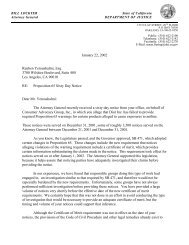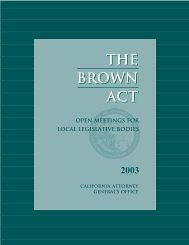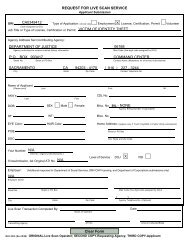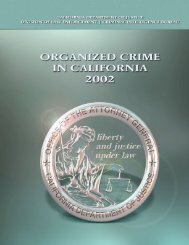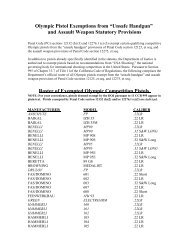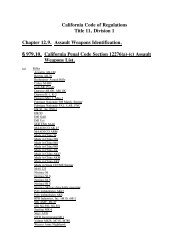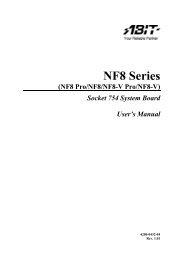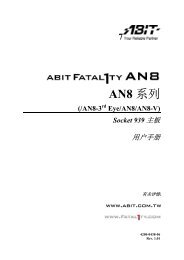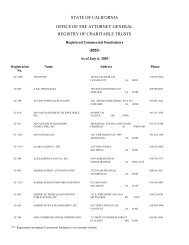Legal Rights of Persons With Disabilities - Ossh.com
Legal Rights of Persons With Disabilities - Ossh.com
Legal Rights of Persons With Disabilities - Ossh.com
Create successful ePaper yourself
Turn your PDF publications into a flip-book with our unique Google optimized e-Paper software.
hearing and speech. (47 U.S.C. ' 225(b); 47 C.F.R. ' 64.603.) The California Public Utilities Commission<br />
(PUC) is required to establish a "dual party relay system," which allows persons with hearing impairments<br />
to be connected, by way <strong>of</strong> inter<strong>com</strong>munication devices, with persons <strong>of</strong> normal hearing. This system is<br />
designed to make all phases <strong>of</strong> public telephone service accessible. (Cal. Pub. Util. Code, ' 2881.)<br />
"Tele<strong>com</strong>munication Relay Services" (TRS) are the technical means by which TDD/TTY users<br />
and hearing individuals are placed in <strong>com</strong>munication with each other, with typed and voice messages being<br />
translated between the parties. The ADA defines relay services as telephone transmissions services that<br />
permit <strong>com</strong>munication by wire or radio between hearing individuals and those with hearing or speech<br />
impairments that is functionally equivalent to the ability <strong>of</strong> a person without a hearing or speech disability<br />
to <strong>com</strong>municate through such means. (47 U.S.C. ' 64.601(7).)<br />
In addition, <strong>com</strong>munication assistants, individuals who translate conversation from text to voice<br />
and vice versa, must be trained to effectively meet in the specialized <strong>com</strong>munication needs <strong>of</strong> persons with<br />
hearing and speech impairments. Services must be available 24 hours per day and calls may not be limited<br />
in terms <strong>of</strong> duration or number. Provision is also made for confidentiality and emergency assistance. (47<br />
C.F.R. ' 64.604(a).)<br />
Telephone <strong>com</strong>panies may charge a certain amount to all subscribers in order to recover their costs<br />
in providing tele<strong>com</strong>munications devices for persons with hearing impairments. Federal law allows any<br />
telephone carrier to recover costs for producing specialized terminal equipment for people with impaired<br />
hearing, speech, vision, or mobility. Thus, there is no financial burden on telephone <strong>com</strong>panies which<br />
produce tele<strong>com</strong>munication devices. (47 U.S.C. ' 604.)<br />
b. Enforcement<br />
The FCC is assigned the duty to enforce the requirements imposed on tele<strong>com</strong>munications services<br />
by the ADA. If you feel that your tele<strong>com</strong>munications services have violated the ADA, you may file a<br />
<strong>com</strong>plaint with the FCC. The FCC will then refer your <strong>com</strong>plaint to a state agency if the <strong>com</strong>plaint falls<br />
within the state's jurisdiction, or the FCC will handle the <strong>com</strong>plaint itself where it involves interstate<br />
tele<strong>com</strong>munications. However, if a state agency has not resolved the <strong>com</strong>plaint within 180 days, or within<br />
a shorter period, as prescribed by state regulations, the FCC will intervene to resolve the <strong>com</strong>plaint. (47<br />
U.S.C. ' 225(e) and 47 C.F.R. ' 64.604.)<br />
2. Emergency Services<br />
In California, any county which provides emergency services must provide hearing-impaired<br />
teletype equipment at a central location to relay requests for emergency services. In addition, all "911"<br />
public safety answering points must have a tele<strong>com</strong>munications device capable <strong>of</strong> servicing the needs <strong>of</strong><br />
persons with hearing impairments. (Gov. Code, '' 23025 and 53112.)<br />
Under federal law, all "essential telephones" -- meaning coin-operated, emergency use, and other<br />
telephones which are frequently used by people with hearing aids -- must be <strong>com</strong>patible with hearing aids<br />
designed for telephone use. The FCC can delegate enforcement <strong>of</strong> this provision to the state under certain<br />
specified circumstances. (47 U.S.C. ' 610.)<br />
37


